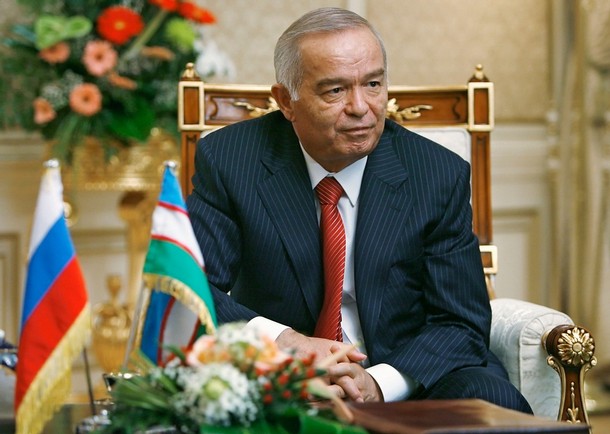
Karimov Accuses Kyrgyzstan of Harboring Terrorists
Publication: Eurasia Daily Monitor Volume: 6 Issue: 102
By:

Uzbekistan’s President Islam Karimov has blamed neighboring Kyrgyzstan for harboring the criminals that carried out shootings in Kharshi-Khanabad on May 26. The Kyrgyz government denied the allegations and increased security at checkpoints on its border with Uzbekistan. The recent disagreement reflects growing tensions between the two neighboring states, as well as within the Central Asian region.
Karimov has previously accused both Kyrgyzstan and Tajikistan of allowing extremist groups to flourish on their territories. In the summers of 1999 and 2000, he blamed then President Askar Akayev for failing to curb the penetration of militants from the Islamic Movement of Uzbekistan (IMU) who tried to cross Kyrgyz territory from Tajikistan to challenge the Tashkent regime. More than 50 Kyrgyz soldiers died as a result of these clashes with militants in the Batken, while Karimov unilaterally ordered the use of Uzbek air force on Kyrgyz territory.
During the Andijan violence in May 2005, when the Uzbek armed forces suppressed demonstrations, Karimov pressured the Kyrgyz regime to extradite refugees who had fled the city into Kyrgyzstan. Kazakhstan’s President Nursultan Nazarbayev has also tightened border control with Kyrgyzstan, during either national elections or instability in Bishkek.
According to Uzbekistan’s official reports, on the night of May 25-26 a group of 2-3 men attacked Kharshi-Khanabad policemen and killed one (www.uza.uz, May 26). However, other sources claimed that over a dozen individuals were killed as a result of sporadic gunfire which continued throughout the night, and that a suicide bomb was detonated. Several reporters even speculated as to whether the incident was a repetition of the violence in Andijan in May 2005.
The incident was only briefly reported by the Uzbek media, and its coverage was restricted to only local reporters. In the few official statements by the Uzbek media, Kyrgyzstan was blamed for allowing the "bandits" to cross the border with Uzbekistan. According to the Uzbek Prosecutor-General’s office, the militants came from Kyrgyz territory and might seek to re-enter the country as an escape route (www.akipress.kg, May 27).
Kyrgyz officials vociferously denied Tashkent’s allegations. The head of Kyrgyzstan’s Border Control Service Tokon Mamytov, said that he had "no evidence" of criminals crossing the Kyrgyz-Uzbek border (www.akipress.kg, May 27). The border service argued that the authorities in Tashkent were spreading disinformation. Following the incident, border troops have patrolled the border more intensively together with other security structures. In the meantime, Uzbekistan has closed the border with Kyrgyzstan and increased its military presence around Kharshi-Khanabad and in Andijan city.
Blaming Kyrgyzstan for spreading instability is convenient for Karimov, who often associates domestic stability with his personal political achievements. Earlier this year, Karimov saw Kyrgyzstan and Tajikistan’s plans to construct hydropower plants as a challenge to Uzbekistan’s national security. The president used regional summits to extend his disapproval of the prospects for regional collaboration on economic or political issues. To date, Tashkent’s relations are adverse with many of its neighbors.
Tashkent’s accusations point toward a lack of trust between the Kyrgyz and Uzbek regimes, and a lack of cooperation over border security. The Kyrgyz authorities called on the Uzbek government to share the facts on the incident in Kharshi-Khanabad and to launch a joint investigation. Kyrgyz MP’s expressed their concern that border incidents are on the rise and that both states need to cooperate to prevent illegal crossings (www.24.kg, May 27).
These incentives for such collaboration are unlikely to last, as both Kyrgyzstan and Uzbekistan have differing military and security capabilities. Among Kyrgyz military experts, some even consider Uzbekistan to be a potential military threat. Although these threat perceptions are not part of the official military doctrine and often represent only personal opinion, they nevertheless influence official policy. The threat of an Uzbek armed invasion on Kyrgyzstan’s territory in the case of a dispute between the two states is informally voiced by a number of experts and politicians.
The May 26 incident once again exposed Karimov’s insulation from the regional community. Unlike Uzbekistan, the Kazakh, Kyrgyz and Tajik regimes have been managing their differences at regional summits and formulating ground rules for collaboration. Bilateral agreements on trade, migration and security agreements are intact between these states, albeit post-factum – after the states faced the urgent necessity to collaborate. Yet, the Uzbek regime continues adding uncertainty and instability into the regional cooperation dynamics. This is a reflection of Karimov’s domestic politics in the regional setting.




